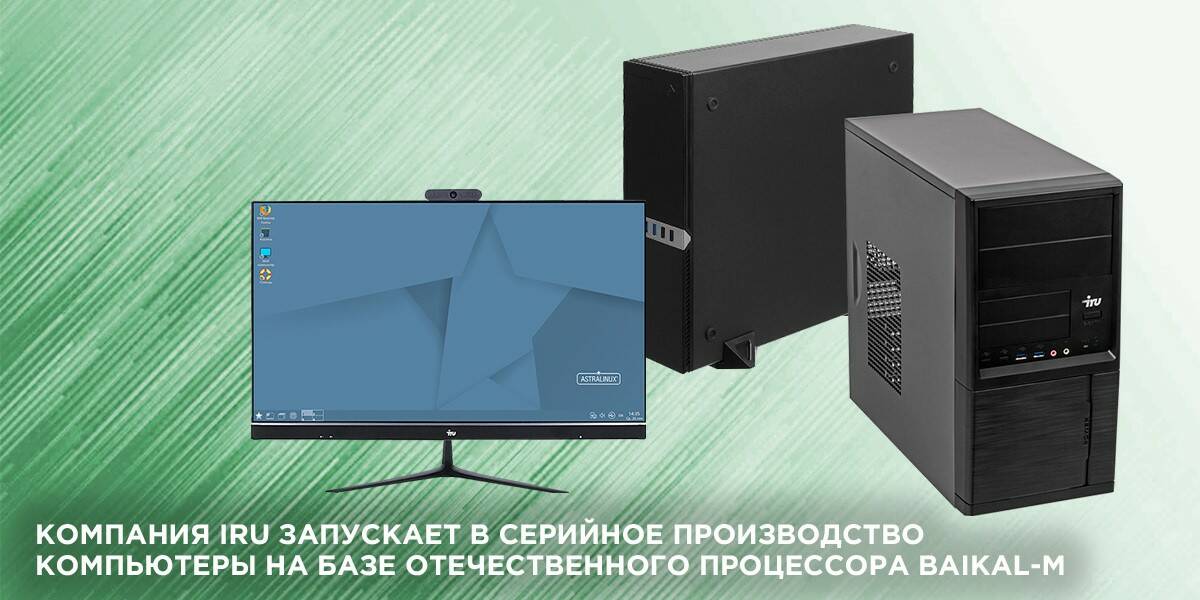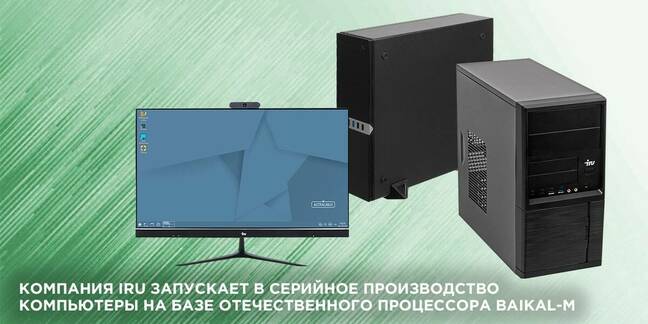Russian Arm SoC Now Shipping In Russian PCs Running Russian Linux

Russian fabless semiconductor company Baikal is celebrating after local PC-maker IRU started using its silicon in a workstation.
Baikal designs SoCs that employ Arm and MIPS technology. On the latter architecture, it offers the twin-core Baikal-T that it says is the "first silicon implementation of the MIPS P5600 CPU core with a wide range of high-speed interfaces".
The model-T is said to be ideal for storage, industrial automation, communications devices, and desktops.
However, it's Baikal's model-M that got the nod from IRU. The SoC uses eight Arm Cortex-A57 cores that run at up to 1.5GHz, an eight-core Mali-T628 GPU, dual-channel DDR3/4 support, 4MB L2 cache and 8MB L3 cache, PCIe 3, USB 3.0 and 2.0, and four Ethernet controllers – two at 10GB and the others at 1GB.
By way of comparison, the A57 is a predecessor of the A72, which is found in the quad-core Broadcom BCM2711 SoC used in the Raspberry Pi 4. The A72 uses rather less power and is speedier than the A57. Those changes make the Pi 4 a decent all-day desktop, but hardly a high-performance screamer. Indeed, the BCM2711 fares poorly in comparison with Intel's Core i3 silicon.
Curiously, IRU's web site is devoid of information about the new workstations. Baikal states that IRU offers its silicon inside a micro tower and small form factor device.
Whatever form factor you fancy, the workstations offer up to 32GB of RAM and storage options ranging from one to three terabytes.
The devices run Astra Linux, a distribution designed to be secure enough for use by Russian government and military users, in accordance with a 2010 decree requiring use of open products. Baikal said all software installed on the machines is approved by Russia's Ministry of Telecom and Mass Communications and Ministry of Industry and Trade. The company also suggests one of the two models, named "Agat", as offering everything a civil servant needs to get through their day.
Another model – "Opal" – is suggested for general use.
- Russia's Elbrus has a RISC-V competitor as Yadro prepares native chips for launch
- International Space Station actually spun one-and-a-half times by errant Russian module's thrusters
- Here's 30 servers Russian intelligence uses to fling malware at the West, beams RiskIQ
Neither Baikal nor IRU has been kind enough to name a price for the Arm-powered hardware. And as we mentioned above, IRU hasn't bothered to mention them, never mind offer them for sale.
Such gripes aside, the machines reflect Russia's desire to be less dependent on technology sourced from its antagonists in the West. The new workstations' modest specs suggest that ambition comes at a price on the desktop. ®
From Chip War To Cloud War: The Next Frontier In Global Tech Competition
The global chip war, characterized by intense competition among nations and corporations for supremacy in semiconductor ... Read more
The High Stakes Of Tech Regulation: Security Risks And Market Dynamics
The influence of tech giants in the global economy continues to grow, raising crucial questions about how to balance sec... Read more
The Tyranny Of Instagram Interiors: Why It's Time To Break Free From Algorithm-Driven Aesthetics
Instagram has become a dominant force in shaping interior design trends, offering a seemingly endless stream of inspirat... Read more
The Data Crunch In AI: Strategies For Sustainability
Exploring solutions to the imminent exhaustion of internet data for AI training.As the artificial intelligence (AI) indu... Read more
Google Abandons Four-Year Effort To Remove Cookies From Chrome Browser
After four years of dedicated effort, Google has decided to abandon its plan to remove third-party cookies from its Chro... Read more
LinkedIn Embraces AI And Gamification To Drive User Engagement And Revenue
In an effort to tackle slowing revenue growth and enhance user engagement, LinkedIn is turning to artificial intelligenc... Read more


